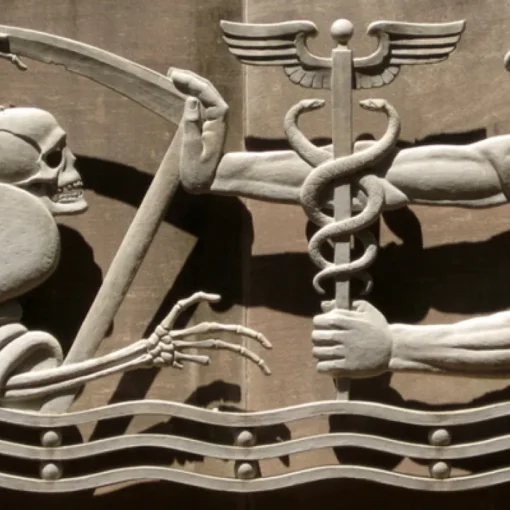Are we witnessing the unfolding of God’s wrath upon our nation? Is America facing divine punishment for a collective departure from spiritual and moral principles? How do ancient warnings about disobedience and retribution resonate with the challenges facing our society today? Explore these compelling questions as we delve into the intersections of biblical teachings and contemporary realities.
While addressing different audiences and contexts, Deuteronomy 28:15-68, Romans 1:18-32, and 2 Peter 2:1-22 share underlying themes that allow for a theological and conceptual connection across these passages. These themes revolve around disobedience to God, the consequences of such disobedience, and the manifestation of God’s judgment. Let’s explore these ties:
Deuteronomy 28:15-68 – The Covenant Context
Deuteronomy 28 details blessings for obedience and curses for disobedience to God’s commandments given to the Israelites. It sets a foundational understanding of God’s relationship with His people: blessings are contingent upon their adherence to His law, and curses follow their disobedience. The curses encompass a range of personal and national calamities intended to serve as a deterrent against abandoning God’s ways.
Deuteronomy 28:15-68 outlines the curses that would befall the Israelites if they did not obey the commandments and laws God gave them through Moses. These curses can be categorized into those directly affecting individuals and those with a more national or collective impact. However, such a separation might not always be explicitly stated in the text. The nature of these curses often blurs the lines between personal and national consequences, as they are interwoven and affect the community and individuals within it. Here’s an attempt to categorize them based on their primary focus:
Individual Curses:
- Cursed in the city and in the field (v. 16): Affects individuals’ prosperity in urban and rural settings.
- Cursed shall be thy basket and thy store (v. 17): Personal economic hardship.
- Cursed shall be the fruit of thy body, and the fruit of thy land, the increase of thy kine, and the flocks of thy sheep (v. 18): Affects family offspring and personal agricultural endeavors.
- The LORD shall send upon thee cursing, vexation, and rebuke, in all that thou settest thine hand unto for to do (v. 20): Individual endeavors and work are affected.
- The LORD shall make the pestilence cleave unto thee (v. 21): Personal health affected by disease.
- The LORD shall smite thee with a consumption, and with a fever, and with an inflammation (v. 22): Various diseases affecting individuals.
- The LORD shall cause thee to be smitten before thine enemies (v. 25): Individuals facing defeat in personal conflicts.
- The LORD shall smite thee with madness, and blindness, and astonishment of heart (v. 28): Mental and physical health afflictions.
- Thou shalt betroth a wife, and another man shall lie with her (v. 30): Personal relationship and family integrity affected.
- Thou shalt build an house, and thou shalt not dwell therein (v. 30): Personal loss of property.
- Thou shalt beget sons and daughters, but thou shalt not enjoy them; for they shall go into captivity (v. 41): Personal family suffering.
National Curses:
- Cursed shall be thy basket and thy store (v. 17): While personal, the cumulative effect of economic hardship impacts national prosperity.
- The LORD shall cause thee to be smitten before thine enemies (v. 25): National military defeat.
- Thy carcass shall be meat unto all fowls of the air, and unto the beasts of the earth (v. 26): National disgrace following defeat.
- The LORD will smite thee with the botch of Egypt, and with the emerods, and with the scab, and with the itch (v. 27): Widespread diseases.
- Thou shalt become an astonishment, a proverb, and a byword, among all nations whither the LORD shall lead thee (v. 37): National infamy.
- The stranger that is within thee shall get up above thee very high; and thou shalt come down very low (v. 43): Economic and social subversion by non-natives.
- He shall lend to thee, and thou shalt not lend to him (v. 44): National economic dependence.
- The LORD shall bring a nation against thee from far (v. 49): National invasion and subjugation.
- A nation of fierce countenance, which shall not regard the person of the old, nor shew favour to the young (v. 50): Ruthless occupation affecting all.
- He shall eat the fruit of thy cattle, and the fruit of thy land, until thou be destroyed (v. 51): National economic exploitation and ruin.
- Thou shalt eat the fruit of thine own body (v. 53): Extreme famine leading to cannibalism during sieges.
- The LORD shall bring thee, and thy king which thou shalt set over thee, unto a nation which neither thou nor thy fathers have known (v. 36, v. 64): National exile.
Romans 1:18-32 – Universal Revelation and Rejection
Paul speaks to a broader, predominantly Gentile audience in Romans (though addressed to the church), addressing the universal knowledge of God through creation (general revelation) and humanity’s universal rejection of that knowledge in favor of idolatry and immorality. The wrath of God revealed against all ungodliness underscores a principle found in Deuteronomy: rebellion against God’s revealed will bring judgment. Paul extends the concept by illustrating that this principle applies not just to Israel but to all humanity, which has turned away from the knowledge of God evident in creation.
Romans 1:18-32 – Both Individual and National Consequences:
- The Wrath of God Against Ungodliness and Unrighteousness (v. 18): This is a general statement about God’s response to human wickedness, applying to individuals and societies that suppress the truth by their wickedness.
Romans 1:18-23 forms a cohesive argument by the Apostle Paul about God’s wrath against human ungodliness and unrighteousness, particularly focusing on humanity’s rejection of God despite His clear revelation to them. Here’s a summary of verses 19-22, contextualized within the broader passage:
Romans 1:18 introduces the theme, stating that God’s wrath is revealed from heaven against all godlessness and wickedness, against people who suppress the truth through their wickedness.
Romans 1:19-20 explains that what can be known about God is plain to humanity because God has made it evident to them. The creation reveals God’s invisible qualities—His eternal power and divine nature—so clearly that people are without excuse for not knowing God.
- Example: The complexity and beauty of the natural world, from the vastness of the universe to the intricacy of DNA, testify to a Creator’s power and divine nature.
Romans 1:21 observes that despite knowing God, people did not glorify Him as God or give thanks to Him. Their thinking became futile, and their foolish hearts were darkened.
- Example: Ancient civilizations acknowledged the existence of a higher power through the worship of various gods and creation itself, yet failed to honor the one true God, leading to idolatry and a departure from God’s truth.
Romans 1:22 humorously notes that while claiming to be wise, they became fools.
- Example: The shift to worshipping idols made to look like mortal humans, birds, animals, and reptiles instead of the immortal God demonstrates this folly.
Romans 1:23 culminates this argument by stating that they exchanged the glory of the immortal God for images resembling mortal man, birds, animals, and creeping things.
- Example: This can be seen in the religious practices of the Egyptians, Romans, and Greeks, who worshipped deities in the form of humans and animals, directly contradicting the inherent knowledge of God’s divine nature and power evident in creation.
This passage, therefore, outlines a tragic progression: from the universal knowledge of God evident in creation to humanity’s rejection of this knowledge, leading to idolatry and a host of moral and spiritual consequences. Paul sets the stage for discussing the depth of human sin and the necessity of salvation through Jesus Christ.
The consequences:
These explanations reflect the progression of sin and its consequences according to Romans 1:23-32, showcasing the severe moral and spiritual decline that occurs when individuals and societies turn away from God, exchanging His truth and glory for lies and idolatry.
- Exchanged the Glory of God for Images (Romans 1:23): Humans swapped their worship and reverence of God’s immortal glory for representations of mortal beings and creatures, a sin of idolatry that prioritizes the creation over the Creator.
- They exchanged the Truth of God for a Lie (Romans 1:25): They chose to believe and live by lies rather than the truth of God, worshiping and serving created things instead of the Creator. This highlights the sin of idolatry in prioritizing anything above God.
- God Gave Them Over to Sinful Desires (Romans 1:24, 26): As a consequence of their idolatry, God allowed them to follow through on their sinful desires, which led to sexual impurity and the dishonoring of their bodies among themselves—indicating a judicial abandonment to their choices and its natural moral consequences.
- Degrading Passions and Dishonorable Acts (Romans 1:26-27): This refers to homosexual acts mentioned as a result of abandoning natural relations for unnatural ones, described as a consequence of their idolatry and rebellion against God’s design.
- A Depraved Mind to Do What Ought Not to Be Done (Romans 1:28): God allowed those who rejected Him to have a depraved mind, leading them to commit morally reprehensible acts. This highlights the spiritual and moral degradation that follows the rejection of divine truth.
- Filled with Every Kind of Wickedness (Romans 1:29-31): The passage lists sins such as envy, murder, strife, deceit, malice, gossip, slander, hatred of God, insolence, arrogance, boastfulness, inventing ways of doing evil, disobedience to parents, lack of understanding, faithfulness, love, and mercy. These sins characterize a society that has turned away from God, showing the broad moral decay that ensues.
- They Not Only Continue to Do These Things but Also Approve of Those Who Practice Them (Romans 1:32): Beyond committing these sins, they also celebrate and approve of others who do the same, indicating a deep moral corruption and a collective endorsement of sin, exacerbating the consequences of their actions.
2 Peter 2:1-22 – False Prophets and Teachers
Peter warns about false prophets and teachers introducing destructive heresies, exploiting believers, and following corrupt desires, leading to their destruction. This passage reflects the Deuteronomic warning against turning away from God’s commandments, now applied to the context of the early Christian community. Peter’s description of the consequences for such individuals and those who follow them echoes the themes of judgment and divine retribution seen in Deuteronomy and Romans.
The characteristics of false prophets and teachers in 2 Peter 2:1-22, detailed with references and explanations, are as follows:
- Secretly Introduce Destructive Heresies (2 Peter 2:1): False prophets and teachers will bring in heretical teachings that deny key doctrines, including the lordship of Christ, which leads to their destruction.
- Many Will Follow Their Sensual Ways (2 Peter 2:2): Their depraved behavior attracts followers, resulting in widespread moral decay and disrepute to the truth.
- Motivated by Greed (2 Peter 2:3): They exploit and deceive others for financial gain, using fabricated stories, with their judgment from God pending.
- Bold and Willful (2 Peter 2:10): These individuals are arrogant, not afraid to slander dignitaries, showing their disregard for authority and celestial beings.
- Act on Instinct Like Irrational Animals (2 Peter 2:12): Their behavior is guided by their base instincts, not spiritual discernment, leading to their ruin.
- Blaspheme Matters They Do Not Understand (2 Peter 2:12): They speak arrogantly of things beyond their understanding, particularly divine matters, inviting destruction upon themselves.
- Carouse in Broad Daylight (2 Peter 2:13): Their indulgence in pleasure is not hidden but flaunted, showing their shamelessness and deception.
- Eyes Full of Adultery (2 Peter 2:14): Driven by insatiable lust, they are always looking for opportunities to engage in immoral acts, preying on the unstable.
- Hearts Trained in Greed (2 Peter 2:14): They have cultivated deep-seated greed, making exploitation of others a practiced skill.
- Forsake the Right Way (2 Peter 2:15): They have knowingly deviated from the path of righteousness, exemplified by the way of Balaam, who was rebuked for his greed.
- Empty Boasts of Freedom (2 Peter 2:18-19): While promising freedom to their followers, they are enslaved by corruption, illustrating the paradox of their claims.
- Entice People Who Are Barely Escaping (2 Peter 2:18): They target individuals seeking to escape from those living in error, offering false promises of liberty.
- Worse Off After Knowing the Way of Righteousness (2 Peter 2:20-21): Those enticed by false teachings, after initially escaping the world’s corruption through knowledge of Christ, find themselves worse if they succumb to these deceptions.
- Dog Returns to Its Vomit (2 Peter 2:22): This proverb illustrates the nature of false teachers who, after momentarily escaping their corruption, inevitably return to their sinful ways, similar to a dog returning to its vomit and a washed sow to her wallowing in the mud.
Connecting the Dots
- Disobedience and Its Consequences: All three passages affirm that rebellion against God and His ways leads to severe consequences. Deuteronomy specifies the curses for Israel’s covenant unfaithfulness, Romans broadens this to the natural consequence of humanity’s general rebellion against God, and 2 Peter highlights the judgment awaiting those who mislead others and indulge in wickedness.
- Divine Justice and Judgment: Each text reflects aspects of divine judgment upon disobedience, whether it’s through the covenant context of Israel (Deuteronomy), the natural revelation given to all people (Romans), or the specific context of false teachings in the early church (2 Peter).
- The Universality of God’s Moral Order: Romans and 2 Peter, written to a different audience and with a different focus than Deuteronomy, reinforces the idea that God’s moral and spiritual order is universal. Disobedience to God, regardless of the covenantal or temporal context, results in divine judgment.
- The Importance of Faithfulness: The call to faithfulness is implicit in the warnings against disobedience. Just as Deuteronomy urges adherence to the covenant, Romans calls for recognizing God through His creation, and 2 Peter warns against following false teachings.
While the direct curses of Deuteronomy 28 are tied to the covenant between God and Israel, the principles underlying these curses—namely, that rebellion against God leads to severe consequences—are universally applicable. Romans 1 and 2 Peter 2 reflect how these principles play out beyond the covenant community of Israel, demonstrating that willful disobedience to God, regardless of the covenantal context, results in moral and spiritual decay.
Essentially, a person or nation that disregards God’s will and pursues a path of rebellion can exhibit the character traits and actions described in Romans 1:18-32 and 2 Peter 2:1-22. These New Testament passages show the continuity of God’s moral law and the consequences of disobedience, emphasizing the need for faithfulness to God’s revealed will.
In Summary
While Deuteronomy 28:15-68, Romans 1:18-32, and 2 Peter 2:1-22 are contextually distinct, they share a thematic link through their focus on the consequences of turning away from God, the judgment that follows disobedience, and the call to maintain faithfulness to God’s revealed will. This connection illustrates the continuity of God’s moral law and the principle of divine retribution across both Testaments.






